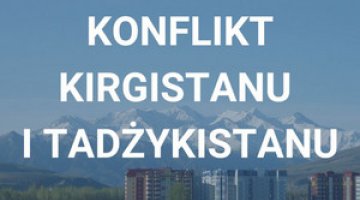Kyrgyzstan: A new opponent for the government in Bishkek
On 4 March, municipal elections were held in three towns in Kyrgyzstan (Karakol, Tokmak and Osh). The elections in Osh, where radical opposition in the form of a new party, National Unity Party, won the vote (47%), were especially important. This nationalist and populist grouping was founded on the eve of the election, and was supported by the leaders of the parties – which are still competing with each other – associated with the south of the country, Kamchibek Tashiev (Ata Jurt), Adahan Madumarov (Butun Kyrgyzstan) and Melis Myrzakmatov, the governor of Osh.Osh is the major urban centre in the south of Kyrgyzstan, and the bedrock of regional and political opposition to the government in Bishkek. The region is weakly controlled by the central government, and in 2010 was the site of violence by supporters of the overthrown President Kurmanbek Bakiev (whose roots are in the south), as well as a bloody ethnic conflict between Kyrgyz and Uzbeks.
Commentary
- The new party unifies the elite from the south of the country, who hitherto have been competing with each other, and potentially strengthens their position against the government in Bishkek. The central government has already had problems with controlling the south of the country, and now the problem may grow; here too, the opposition can readily mobilise supporters (for example, the election was preceded by a 10,000-strong march of National Unity Party supporters).
-
While strengthening its position in the south of the country and exploiting regional tensions, the National Unity Party has not however played the separatist card. Its leaders' ambitions are national, and are focused on the struggle for the highest positions of state (which have been held by representatives from the north of the country since the coup in 2010, though Ata Jurt is the largest party in parliament). During the local elections, opposition leaders demanded amendments to the constitution (to return to the Constitution of 1993, and to strengthen presidential power). They also criticised the government's policy towards Russia (Bishkek demanded repayment of the debts for the use of military facilities on Kyrgyzstan's territory, which caused dissatisfaction in Moscow). The threats of yet another 'revolution' (as in 2005 and 2010), which politicians from the south have been making, is also disturbing.
- Although the political situation in Kyrgyzstan has appeared to be relatively stable since the coup in 2010 (for example, a peaceful and democratic referendum and elections were held in 2010 and 2011), the profound economic and social crisis, the weak performance of the state apparatus and the increasing north-south rigidities still remain major problems. The opposition’s consolidation in the south of the country, and the associated threat of further tensions in relations with Bishkek, poses a serious threat to the stability of Kyrgyzstan. Nationalist and anti-Uzbek rhetoric from the southern leaders, and the ease with which they can organise their social and political protests, are factors that threaten the stability of both the southern regions and the country as a whole.



